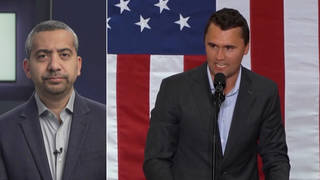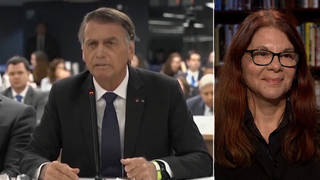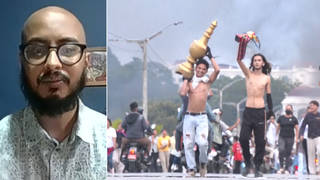
Guests
- Raed Jarraran Iraqi blogger and architect. Raed is Iraq Project Director for Global Exchange.
- Laurie Arbeitermember of The Critical Voice, an affinity group of Artists Against the War who organized the We Will Not Be Silent T-shirt campaign.
A growing movement across the country is challenging what appears to be an increase in racial profiling at airports. More and more travelers are donning T-shirts that say “We Will Not Be Silent” in English and Arabic in solidarity with Iraqi blogger and activist Raed Jarrar who was forced to change the T-Shirt before boarding a JetBlue Airways flight at Kennedy airport.
We called JetBlue, the company responded with a statement saying that according to the airline”s preliminary findings the request to remove Raed”s T-shirt was not made by a JetBlue crew member.
We also called the Transportation Security Administration, they confirmed that a TSA employee was involved, along with two JetBlue employees, in talking with Raed. But they said it was not a TSA employee who bought him the T-Shirt to change into.
Since our interview with Raed, major newspapers and corporate TV networks in the United States and around the world have picked up the story. Now, more and more people are putting on We Will Not Be Silent T-shirts in solidarity when they travel.
Transcript
AMY GOODMAN: There is a growing movement in this country to challenge what appears to be an increase in racial profiling at airports. More and more travelers are wearing T-Shirts that say “We Will Not Be in Silent” in English and in Arabic. Why? About two weeks ago, Iraqi activist and blogger, Raed Jarrar, did the same thing as he was boarding a JetBlue Airways flight at Kennedy airport here in New York. Airport officials forced him to change his t-shirt before getting on the plane. Democracy Now! spoke with Raed Jarrar ten days ago about the incident.
RAED JARRAR: Then I was supposed to take my airplane, my JetBlue airplane from JFK to Oakland in California last Saturday. So I went to the airport in the morning, and I was prevented to go to my airplane by four officers, because I was wearing this t-shirt that says “We Will Not Be Silent” in both Arabic and English. And I was told by one of the officials that wearing a t-shirt with Arabic script in an airport now is like going to a bank with a t-shirt that reads, “I am a robber.”
AMY GOODMAN: That’s what the security said to you?
RAED JARRAR: Yeah. I was questioned by four officials from — I think some of them were from JetBlue and others were maybe policemen or FBI. I have no idea. I took their names and badge numbers, and I filed a complaint through ACLU against them, because I asked them very directly to let me go to the airplane, because it’s my constitutional right as a U.S. taxpayer and resident to wear a t-shirt with Arabic script. And they prevented to let me exercise this right, and they made me cover the script with another t-shirt.
AMY GOODMAN: So they said you could not fly if you wore your t-shirt that said, “We Will Not Be Silent”?
RAED JARRAR: Yes. They said that very clearly.
AMY GOODMAN: Iraqi blogger, Raed Jarrar. We called JetBlue. The company responded with a statement saying that according to the airline’s preliminary findings the request to remove Raed’s t-shirt was not made by a JetBlue crewmember. We also called the Transportation Security Administration. They confirmed a TSA employee was involved, along with two JetBlue employees, in talking with Raed. But they said it wasn’t the TSA employee who bought Raed the t-shirt to change into.
Well, since our interview with Raed, major newspapers and corporate TV networks in the United States and around the world have picked up this story. Now, more and more people are putting on the “We Will Not Be Silent” t-shirts in solidarity when they travel.
Laurie Arbeiter is one of them. She joins us in our Firehouse studio, a member of the Critical Voice, an affinity group of Artists Against the War who organized the “We Will Not Be Silent” t-shirt campaign. The woman behind the man, you gave Raed the t-shirt he wore that day?
LAURIE ARBEITER: Yes, I did, Amy.
AMY GOODMAN: When did you start making these t-shirts?
LAURIE ARBEITER: We began the campaign on March 20, 2006, which was the third anniversary of the war in Iraq.
AMY GOODMAN: Why?
LAURIE ARBEITER: Well, we decided that we needed to, as artists and activists, we needed to respond to what was going on in this country and to what we see as an illegal war and occupation of Iraq. And so we designed the t-shirts and actually also a flag that said, “No allegiance to war, torture and lies.” And we brought it out into New York City for eight hours on March 20. And that was the first day of our campaign.
AMY GOODMAN: How many people have gotten your t-shirts?
LAURIE ARBEITER: Oh, several thousand at this point. And so many more are requesting the t-shirts from all over the country and all over the world.
AMY GOODMAN: Now, they’re not just in Arabic and English, are they?
LAURIE ARBEITER: No, we also have them in just in English, in Spanish and in Farsi. And we’re getting requests for Hebrew, and we’re thinking of bringing them back in the original language that the statement was made, which was German.
AMY GOODMAN: But you went further. You actually got on a flight with this t-shirt, after Raed was told he couldn’t wear that t-shirt on the flight?
LAURIE ARBEITER: Yes, we did. We heard the story. Actually, it broke on Democracy Now!, and we heard it. And we immediately all met. There were four of us. And we were appalled to hear what happened to Raed. I know him. I’m the person that gave him the t-shirt originally in Washington, D.C. And we felt we needed to respond and do something to stand in solidarity with Raed. So we bought tickets on JetBlue to go to Washington, D.C., and we flew on the 24th of August.
AMY GOODMAN: So you just flew a few days ago. What happened?
LAURIE ARBEITER: Well, we went to the airport. We met and picked up our tickets. And then we proceeded to the gate. At times, we were actually separated. We dispersed. We were, you know — and then came back together to go through security. There was no incident, actually. We did not get stopped. We went to the gate. We waited there, and we boarded the plane. And the irony is that we were actually assigned to the seat that Raed was moved to, after he was moved out of the seat that he had been assigned.
AMY GOODMAN: Well, wait, because that part of the story is not told very much. Raed was forced to put on this other t-shirt to cover his, that said in Arabic and English, “We Will Not Be Silent.” You’ve been giving out this flyer, “Is it true, blue?” that ends by talking about the authorities telling him they can’t be sure what it says in Arabic, and they can’t get a translator. So he would not — even though in English it said, “We Will Not Be Silent.” How do you know when he went on the plane, he first got the front seat, then pushed to the back?
LAURIE ARBEITER: Actually, I spoke with him, and I think he’s also written that in his blog. He was then called — after having put on the other t-shirt and waiting to board the plane, he was called back to the desk, and he was told that he would not be in his assigned seat that he had booked a month before. And they moved him to the back of the plane. And we happened to be assigned to that same seat that he wound up in.
AMY GOODMAN: I talked to someone who wore the “We Will Not Be Silent” t-shirt, without the Arabic, and flight attendants were coming up to him, “What does it mean? What does it mean?” You said you’re thinking of translating it also into the original German. What is the original — the origin of this?
LAURIE ARBEITER: Well, the original statement was made by a student resistance movement in Nazi Germany called the White Rose. They tried to encourage the German population to resist the Nazis and Hitler by sending leaflets out into the German population. And the fourth leaflet they signed, “We Will Not Be Silent,” and that was why we took that statement and translated it into those four languages that we wear today.
AMY GOODMAN: Laurie Arbeiter, if people want to get more information about this growing movement against high-flying profiling, where can they go?
LAURIE ARBEITER: They can write to us at wewillnotbesilent@gmail.com.
AMY GOODMAN: I want to thank you for being with us.
LAURIE ARBEITER: Thank you.











Media Options